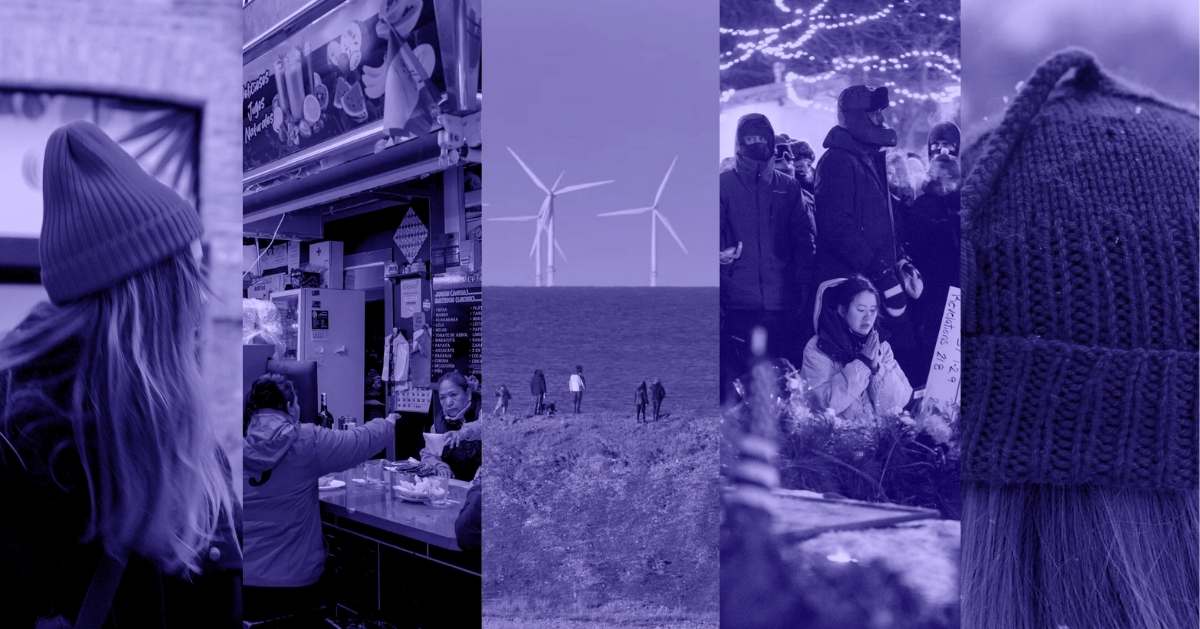Every day the Good Good Good team collects the best good news in the world and shares it with our community. Here are the highlights for this week!
If you want to get good news in your inbox every day, join the Goodnewsletter — the free daily newsletter designed to leave you feeling hopeful.
The Best Positive News We're Celebrating This Week —
Helping cut both emissions and car traffic, companies are incentivizing employees to commute to work by bike, train, or other sustainable means
In the U.K., a government initiative to get more people out of cars allows employees to spread out the cost of a new bike over 12 months, and save up to 40 percent since payments come directly out of salaries and aren’t taxed. Over 1.6 million from over 40,000 different employers have taken advantage of it since it first rolled out in 1999.
This is part of a wider trend and shift in how people commute, as both companies strive to reach self-imposed carbon reduction goals, and workers demand their employers become more environmentally minded.
In the U.S., Lyft implemented an employee parking fee for those who commute by car and use the money to subsidize more sustainable transportation costs for employees who didn’t drive to work.
Conservation efforts from a coalition of organizations has led to the dramatic increase of wildlife in Europe in the last 50 years
Millenia of hunting, exploitation, and habitat loss, especially in the last 500 years, drove many animals in Europe to near extinction by the 1950s, with some species completely wiped out.
Now, thanks to widespread conservation efforts by individuals, conservationists, and governments, wildlife populations are dramatically increasing — with animals like the European bison growing in population by an average of over 16,000%, and red deer by an average of 331%.
It’s an encouraging reminder that though human activity was to blame for the declining numbers in the first place — human activity can also help bring about change for the better, too.
The ozone layer is on track to be restored entirely for most of the world by 2040
Increased use of ozone-depleting chemicals — like chlorofluorocarbons (CFCs) — in the 1980s led to the rapid and alarming depletion of the ozone layer, which protects people from the sun’s harmful ultraviolet rays.
Almost as rapidly, countries around the world came together to implement the Montreal protocol in 1989, to phase out and eventually eliminate 99% of the chemicals from use.
And now, scientists say that swift action is paying off — the latest UN report has the ozone layer on track to be completely restored over much of the world by 2040, except only for the polar regions.
The depletion of the ozone layer was once the most significant crisis facing humanity — and the unified, global response “shows us what can and must be done as a matter of urgency to transition away from fossil fuels” in the face of the climate crisis.
The inventor of the Steadicam for video cameras used the technology to develop a smooth-riding wheelchair for people with low mobility
For folks with lower levels of mobility, typically their only options are walkers and wheelchairs. Seeing a need for something in between those options, inventor Garrett Brown got to work on a solution.
Brown is the inventor of the Steadicam, a lightweight, hand-held stabilizing device that gives video camera operators a steady hand when capturing shots with a lot of motion. He applied that same technology to help people with disabilities move more smoothly, too.
Brown’s customers say it’s given them freedom and autonomy, and one of his Zeen chairs was even requested by the Vatican to reportedly help Pope Francis get around more smoothly. He’s made and distributed about 100 so far.
A dog is helping detect, protect, and save Australia’s endangered koala population
Max is a dog with a nose for one thing: koala poo. Max’s trainers are part of a program researching how many koalas live on private properties in this particular region of Australia.
Max helps their efforts by finding poo on the ground, which helps the program determine both how many koalas there are, how healthy the population is, and if they’re carrying any threatening diseases.
Max’s work, and that of his trainers, is incredibly important in protecting and saving koalas in Australia as they face increasing drought and wildfires due to climate change. The area he’s searching is on higher ground and could provide safe refuge for the animals if it’s protected and conserved.
An 18-year-old just became the youngest Black mayor in U.S. history — and he wants to revive his struggling Arkansas town
Hoping for some new energy and an optimistic outlook on their struggling town, residents of Earle, Arkansas elected 18-year-old Jaylen Smith to be their new mayor.
Since the 1900s, Earle’s population has dropped nearly in half, businesses have left, a faulty drainage system floods the town each time it rains, it has no supermarket, and so on. Instead of leaving too, Smith asked “Why should I have to go somewhere else to be great when I can be great right here in Earle, Arkansas?”
Smith ran primarily on getting a supermarket back into the town, as well as tearing down dilapidated buildings, lifting the community’s morale, patching up streets, and more.
And while not everyone was convinced of his qualifications, residents were ready for his fresh ideas to get their town back to where they knew it could be.
A Central Florida town just opened a community center where a charcoal plant used to pollute a Black neighborhood
For three decades, West Ocala was home to a charcoal plant, which spewed soot all over the homes of its African American residents. And for years, resident Ruth Reed fought to have the plant closed — until it finally did in 2006.
The city purchased the property in 2018, knocked down the plant, and in its place built the Mary Sue Reid Community Center at Reed Place — named after two women who fought for the positive change, Reed and a longtime City Council member.
The new center has a gymnasium, library branch, gathering spaces, and more — and needless to say, much cleaner air.
More good news of the week —
After vanishing over a century ago, grey wolves are thriving again in California. Scientists confirmed a grey wolf pack gave birth to eight pups in the spring, a “really great sign” of the wolves’ health.
The West Point military academy is removing all Confederate symbols from its campus. Robert E. Lee was superintendent of the school before he turned on the U.S. military to command the confederate army.
The new federal spending bill includes funds to improve access to health care for Native Americans. Inadequate funding for Native Americans’ health services has been a longtime problem, so this is a much-need and celebrated addition to the bill.
Plastic pollution on Australian beaches has decreased by nearly one-third since 2013. The country implemented several different initiatives at the local level to determine which was most effective at reducing pollution.
The U.S. just approved the world’s first vaccine to help protect declining honey bees. Critical for biodiversity and conservation, humans also depend on honey bees to pollinate a large portion of our food supply.
A new bill gives long-sought water and land rights to five Native tribes in Arizona. The tribes have been working to secure these rights for years, allowing them to develop infrastructure to both conserve and transport water, and protect the sacred resource.
The U.S. Department of Agriculture extended funding to smaller-scale farmers for climate mitigation and emissions reduction. The department is now investing a total of $3 billion in climate-friendly farming, critically supporting small farmers.
A new analysis shows that wind and solar could generate more energy than nuclear and coal this year. Production is already outpacing predictions, though natural gas continues to be a primary source of energy.
Using hydrogen and UV light, scientists destroyed 95% of two kinds of toxic “forever chemicals” in 45 minutes. Chemicals like these have been widespread in waterways around the world, risking both human health and biodiversity.
3M announced it would stop making "forever chemicals" by 2025. The PFAS chemicals are found in coated takeout containers, stain-resistant furniture, and so much more, and have been found in food sources and waterways.
In response to the Taliban’s ban on women learning, universities in the U.K. are offering free courses to Afghan women. As long as they have internet access, both women and girls will be able to study more than 1,200 courses from top institutions.
A new vaccine was developed that simultaneously kills and prevents brain cancer. The unique approach both eliminates existing brain tumors and trains the immune system to prevent them from coming back.
The largest landfill solar farm project is being built in New Jersey. The farm contains 56,000 panels and is projected to power more than 4,000 households, and is an example of what the more than 10,000 closed landfills in the U.S. could also become.
Researchers in China created a device that can split seawater to produce hydrogen. Transparently, the science behind this one is a bit over our heads, but they overcame a lot of obstacles to develop a less carbon-intensive, inefficient way to produce hydrogen.
A study on long COVID cases found that the majority of patients make a full recovery within 12 months. A year is still a long time, but only about 25% of patients who develop long COVID have symptoms that last longer than a year.



